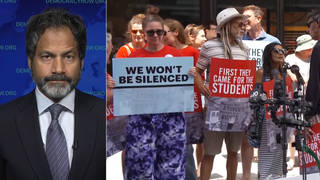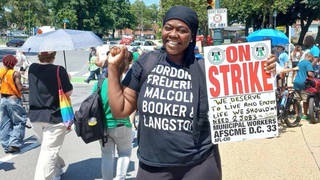
Guests
- Norman Finkelsteinauthor and scholar. He has two books out this week: Knowing Too Much: Why the American Jewish Romance with Israel Is Coming to an End and What Gandhi Says: About Nonviolence, Resistance and Courage.
Links
- "Knowing Too Much: Why the American Jewish Romance with Israel is Coming to an End.” By Norman Finkelstein. (OR Books, 2012)
- "What Gandhi Says: About Nonviolence, Resistance and Courage." By Norman Finkelstein. (OR Books, 2012)
- Norman Finkelstein’s Official Website
- Follow Norman Finkelstein on Twitter: @normfinkelstein
Norman Finkelstein, author of the new book, “Knowing Too much: Why the American Jewish Romance with Israel Is Coming to an End,” argues that President Obama’s hawkish support for Israel is belied by his liberal background as a law professor and community organizer. Responding to Obama’s speech this year before the American Israel Public Affairs Committee, Finkelstein says, “President Obama clearly doesn’t believe a word he’s saying [on Israel-Palestine]. And that’s probably the most troubling or the most disconcerting thing about listening to him. … He says we have Israel’s back. Well, what he actually means is, rich American Jews have me, meaning Obama, in their pocket, and I have my hands in their pocket.” Known as one of Israel’s most prominent critics, Finkelstein says the goal of the Boycott, Divest and Sanctions campaign and the broader movement for Middle East peace should be to mobilize public opinion on what most already support: a two-state solution rooted in international law. “Politics is not about personal opinions,” Finkelsten says. “It’s about trying to reach a public and getting them to act on their own sense of right and wrong.” [includes rush transcript]
Transcript
AMY GOODMAN: Well, let’s go to President Obama for a minute. This is when he was speaking before the American Israel Public Affairs Committee’s annual convention in March, touting his military and diplomatic support for the Israeli government.
PRESIDENT BARACK OBAMA: The fact is, my administration’s commitment to Israel’s security has been unprecedented. Our military and intelligence cooperation has never been closer. Our joint exercises and training have never been more robust. Despite a tough budget environment, our security assistance has increased every single year. And just as we’ve been there with our security assistance, we’ve been there through our diplomacy. When the Goldstone Report unfairly singled out Israel for criticism, we challenged it. When Israel was isolated in the aftermath of the flotilla incident, we supported them. When the Durban Conference was commemorated, we boycotted it, and we will always reject the notion that Zionism is racism. When one-sided resolutions are brought up at the Human Rights Council, we oppose them. When Israeli diplomats feared for their lives in Cairo, we intervened to save them. When there are efforts to boycott or divest from Israel, we will stand against them. And whenever an effort is made to delegitimize the state of Israel, my administration has opposed them. So there should not be a shred of doubt by now. When the chips are down, I have Israel’s back.
AMY GOODMAN: President Obama addressing AIPAC. Your response?
NORMAN FINKELSTEIN: Well, I think the obvious response is that President Obama clearly doesn’t believe a word he’s saying. And that’s probably the most troubling or the most disconcerting thing about listening to him. President Obama, he grew up or he got his political start in a liberal Jewish area of Chicago in Hyde Park. And his company, his crowd, his constituency was basically, in significant part, liberal American Jews. And he knows what he’s saying is false. He’s probably the most—least—he’s the least political president in the—at least in modern American history. He doesn’t really believe a word he’s saying.
If you read, for example, the memoirs of Cheney and Rumsfeld—I did read through them. They’re hefty volumes, but I went through them, curiosity. Like them or not, there is deep conviction there. You know, with Cheney, when he first meets Bush, when Bush is going to nominate him for president, he says to Bush—and I believe it—I know a lot of memoirs is, you know, not to be taken literally. But he says to Bush, “I’m very conservative. I’m warning you.” And Bush says, “That’s OK. You know, we can deal with that.”
Obama is nothing. One day he makes death lists of people to kill, the next day he gives Bob Dylan a medal. Then he talks about how he supports Israel blindly. And you could easily imagine, if there were money and votes, that the next day he would be supporting Palestinian rights. There is absolutely no conviction there. And I think there, Peter Beinart, in his book, his recent book, The Crisis of Zionism, he gets it exactly right. He says Obama is actually a liberal Jew in his mental outlook, and so he knows everything he’s saying is not true. He says he has—we have Israel’s back. Well, what he actually means is, rich American Jews have me, meaning Obama, in their pocket, and I have my hands in their pocket. He wants liberal Jewish contributions. And that’s really what it’s about.
AMY GOODMAN: And yet, you’re saying that liberal Jews in America are changing their views on Israel and Palestinians?
NORMAN FINKELSTEIN: Yeah, you know, the—there’s no question, if you look at two kinds of information. You can look at, for example, the poll data, and the poll data shows that there’s a serious decline, not yet—we can’t call it a precipitous decline, but there is a significant decline in American Jewish support for Israel. And then there’s what you might call the anecdotal data, the—what you might call the high-profile defections. So there’s a Peter Beinart, who’s a former senior editor at The New Republic; then there’s David Remnick in The New Yorker — and both of them influential positions. And you know they have one finger in the air checking which way the wind is blowing, and they have very sensitive antennae. And they realize the Jewish community is moving in a new direction, and we better, as it were, you know, get with the program. I know I’m mixing metaphors there, but get with the program.
The Jewish community is changing. It used to be, even—interestingly enough, even as early as about, say, six or seven years ago, the chief correspondent for The New Yorker on the Israel-Palestine conflict was Jeffrey Goldberg. And Jeffrey Goldberg now, he’s become a kind of caricature even of himself as he tries to defend Israel blindly, and he’s also no longer at The New Yorker, because the kind of coverage, the kind of apologetics, the kind of just hackneyed propaganda simply won’t fly any longer with the American Jewish community. They don’t want to hear it. They don’t believe it, you know, because at least in the case of Netanyahu, you could say, there is—and Avigdor Lieberman, there’s a certain amount of truth in advertising. And it’s very difficult to, from a liberal point of view, justify the way they carry on.
Just to take one other example, you are in the—I speak a lot on college campuses. And liberal American Jews, especially young American Jews, they’re very idealistic, as I’m sure you know from your own experience and your own family. They tend to be liberal and idealistic. So it’s 2006. Israel invades Lebanon. It’s the last 72 hours. The war is over. It’s over. Israel—the U.N. has passed a resolution finally. Condoleezza Rice is blocking it. The war is now over. And then in the last 72 hours, Israel drops four million—four million cluster submunitions on South Lebanon. Human Rights Watch did a very good report; it’s called “Flooding South Lebanon.” “Flooding South Lebanon.” Now, you’re young, you’re Jewish, you’re in a college campus—you don’t want to defend that in public. Or it’s 2008, 2009, Israel invades Gaza, and it drops white phosphorus, a substance that reaches 1,500 degrees Fahrenheit. It drops it on two hospitals: al-Quds Hospital, al-Wafa Hospital. You’re young, you’re Jewish, you’re idealistic—you don’t want to defend those sorts of things. It’s just impossible for you, especially if you’re a younger person. You haven’t yet become too cynical about the ways of the world. It’s impossible for you to reconcile your idealistic liberal credo, beliefs. And young people, as I hope you still remember, they tend to really believe what they say. There’s a certain depth of passion and commitment, conviction, honest conviction. They can’t reconcile that with the way Israel carries on. It’ not possible.
AMY GOODMAN: And where do you see that point of view being expressed in this country? Do you see it in the media? Do you see it in elite politics?
NORMAN FINKELSTEIN: It’s expressed in several places. First of all, and most importantly, it’s expressed on the Internet. It’s not yet to the point of the Washington Post or the New York Times, but it’s definitely liberal bloggers, liberal Jewish bloggers. You know, during the attack on Gaza, and then during the assault on the Mavi Marmara, the liberal Jewish bloggers were very tough on Israel. And frankly, there were few areas of disagreement between myself and them.
Let me just take one other example, which I think is kind of illustrative. If you go back a generation, when Professor Chomsky was doing battle intellectually with the liberal Jewish community, so his main adversaries were people like Michael Walzer, Alan Dershowitz, Irving Howe and—Dershowitz, Howe, Walzer—those types of persons—the area of agreement, if you were to take a Venn diagram of the two, you couldn’t even—they didn’t even touch. There was no agreement on anything. Now, when I sat down and read Peter Beinart’s book—and he’s sort of representative of the same left-liberal tradition, but now—I would say I agreed with about 80 percent. I was quite—I was very positively surprised by that. The amount—the area separating me from what you would call left-liberal—I mean, they may not like to hear this, but the amount of space separating me from them is—OK, it’s still there. There is a significant 20 percent. But 80 percent, yeah, there’s a large overlap. And that, I think, is not because I’ve gone soft, you know, I’m becoming—you know, moving towards the center. No, I’m not. Same principles as always. I think because the spectrum has shifted. It’s shifted significantly.
AMY GOODMAN: We’re talking to author, scholar, activist Norman Finkelstein. He has just written the book, out this week, Knowing Too Much: Why the American Jewish Romance with Israel Is Coming to an End. When we come back, we’ll talk about his other book, What Gandhi Says: About Nonviolence, Resistance and Courage. What Norman Finkelstein found might surprise you. Stay with us.
[break]
AMY GOODMAN: Our guest, Norman Finkelstein, he has published two books this week: one, Knowing Too Much: Why the American Jewish Romance with Israel Is Coming to an End; his other is What Gandhi Says: About Nonviolence, Resistance and Courage. Before we go to Gandhi, your views on a two-state solution and the whole Boycott, Divestment, Sanction movement?
NORMAN FINKELSTEIN: Well, I think one of the problems is the question is often incorrectly posed. The question is not what my personal views are. Here, and I am going to—we’re going to return to it in a moment—I agree with Gandhi. You don’t start with what your opinion is. You start with where public opinion is at. And the purpose of politics is to try to get people to act on the beliefs they already hold. So I think it’s often mistaken when people asked, “Do you support one state or two states?” as if politics were a question about what I support. Politics, to me, is about the maximum you can hope for, in order—you know, trying to reach justice, the maximum you can hope for in a given context. And our given historical context now, you’d say the limit of the spectrum, the very end of the spectrum, would be, say, human rights organizations.
So, you consider yourself a left-of-center program, Democracy Now!, and who do you have on from Egypt? A representative from Human Rights Watch, because you recognize that’s the limit of the spectrum of progressive thought in the world we live. Maybe we wish it went further than Human Rights Watch, but it doesn’t. And that’s why you have HRW as your—the person to be interviewed. And so, taking that—
AMY GOODMAN: And I would say, for Democracy Now!, we consider ourselves a grassroots global news hour, bringing out a big spectrum of opinion.
NORMAN FINKELSTEIN: Right, but you’re trying to reach the limits of progressive opinion. And that’s how I want—that’s who I want to reach. I don’t want to go beyond it, because then I become a cult: I’m no longer reaching people. And the limit in the world today is what human rights organizations are saying, what the International Court of Justice is saying, what the U.N. General Assembly is saying. And there you have a complete consensus, apart from the United States and Israel and some South Sea islands. Apart from them, the consensus is clear. It’s a two-state settlement on the June 1967 border and a just resolution of the refugee question based on the right of return and compensation. That’s the limit of opinion. Do my personal views go beyond that limit? Yes, they do. But politics is not about personal opinions. It’s about trying to reach a public and getting them to act on their own sense of right and wrong. And that, to me, is the only place we can go.
The problem as I see it with the BDS movement is not the tactic. Who could not support Boycott, Divestment and Sanctions? Of course you should. And most of the human rights organizations, church organizations have moved in that direction. The problem is the goal. The human—the official BDS movement, they claim to be agnostic, neutral—whatever term you want to use—on the question of Israel. You can’t reach a broad public if you are agnostic on the question of Israel. The broad public wants to know, where do you stand? And if you claim not to have a stand, you lose them. The BDS movement, it always says, and I’m using their language, “We are a rights-based organization. We are based in international law.” I agree with that. That’s where you have to go: rights-based international law. But the international law is clear. You read the last sentence of the 2004 International Court of Justice opinion on the wall that Israel has been building in the West Bank, and the last sentence says, “We look forward to two states: a Palestinian state alongside Israel and at peace with its neighbors.” That’s the law.
And if you want to go past that law or ignore the Israel part, you’ll never reach a broad public. And then it’s a cult. Then it’s pointless, in my opinion. We’re wasting time. And it’s only a wasting of time. It becomes—and I know it’s a strong word, and I hope I won’t be faulted for it, but it becomes historically criminal, because there was a time where whatever we said, it made no difference. Nobody was listening. You could shout whatever you want—who cares? But now, actually, we can reach people. There is a possibility. I’m not saying a certainty. I’m not even saying a probability. But there is a possibility that we can reach a broad public. And so, we have to be very careful about the words we use, and we have to be very careful about the political strategy we map out. Otherwise, we’re going to squander a real opportunity. And I don’t want to squander it. You know, I’ve been at this for 30 years, and I would like to reach that rendezvous of victory. I know it’s a little selfish. I know, a little—
AMY GOODMAN: And that victory would look like?
NORMAN FINKELSTEIN: A victory is what the law says: when Israel packs up its bag and leaves from where it doesn’t belong. You know, last night I watched—
AMY GOODMAN: And that is determined by? We just have 20 seconds.
NORMAN FINKELSTEIN: Mm-hmm.
AMY GOODMAN: That is, what would those lines be?
NORMAN FINKELSTEIN: The lines are clear. It’s the June 1967 border. Just let me say, because I know you have to—I watched last night—I went to see The Five Broken Cameras. And I was very struck.
AMY GOODMAN: A new film out.
NORMAN FINKELSTEIN: A new film on the Palestinian struggle of Bil’in. And at one point they said, “We want the West Bank and Gaza.” And afterwards I turned to a friend of mine who I went to see the film with—you know him, Phil Weiss—I said to him, “Phil, what do you think the appeal of the film would be if they said they wanted the West Bank, Gaza and Israel?” And he turned to me, and he said, “Well, of course, the filmmakers would take it out.”
AMY GOODMAN: We’re going to have to leave it there, and we will do a discussion about Gandhi after the show and post it online. Norm Finkelstein has written the book, Knowing Too Much: Why the American Jewish Romance with Israel Is Coming to an End. His other book, What Gandhi Says.













Media Options